You are visiting Liisbeth’s archives!
Peruse this site for a history of profiles and insightful analysis on feminist entrepreneurship.
And, be sure to sign up for rabble.ca’s newsletter where Liisbeth shares the latest news in feminist spaces.
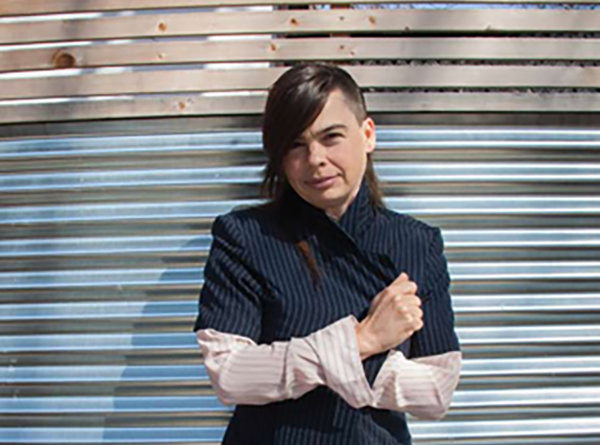
Christina Zeidler, an artist and filmmaker, stumbled into entrepreneurship when her family’s real estate company bought Toronto’s neglected Gladstone Hotel in 2000. The iconic landmark, built in 1889, had only three previous owners but a long history of providing a stylish stay for artists and performers. Zeidler, now 50, took the reins of restoring the building with a clear vision to honour that tradition by creating a boutique art hotel and community space for artists, queers and diverse types to stay, play and work. She enticed long-time staff to stay on (some had worked there for 40 years) and boldly kept the doors open throughout the renovation, inviting the community to experience and lend their ideas to the transformation. Local artists not only exhibited their work during the reno but designed the hotel rooms, making each of the 37 rooms unique creations. Also unique was Zeidler’s drive to use feminism as an operating principle, embracing an anti-oppressive feminist framework, always challenging the status quo, asking questions, and figuring out ways to do things differently.
When Zeidler took a leave in 2012 to work on a feature film, an LGBT romantic comedy, she wrote a manual to guide the management company hired to run the business in her absence. The management company didn’t understand the unconventional brand Zeidler had created and largely ignored what she had written about opposing oppression and celebrating diversity, inclusion, and feminism. They tried to run the Gladstone like a regular hotel, which it clearly was not. When Zeidler returned in 2015, she did so fired up with a mission to shout out the values guiding her business, loud and clear. She had tried once and failed. How could she and her team communicate the hotel’s distinctiveness from every other hotel in the world?
Do Not Disturb: Dissidents At Work and Play
The team revamped the website with bold infographics packed with action words touting the hotel’s social impact, green policies, and revised vision statement: “The Gladstone operates in a feminist, anti-oppressive framework where everyone feels welcome and at home.”
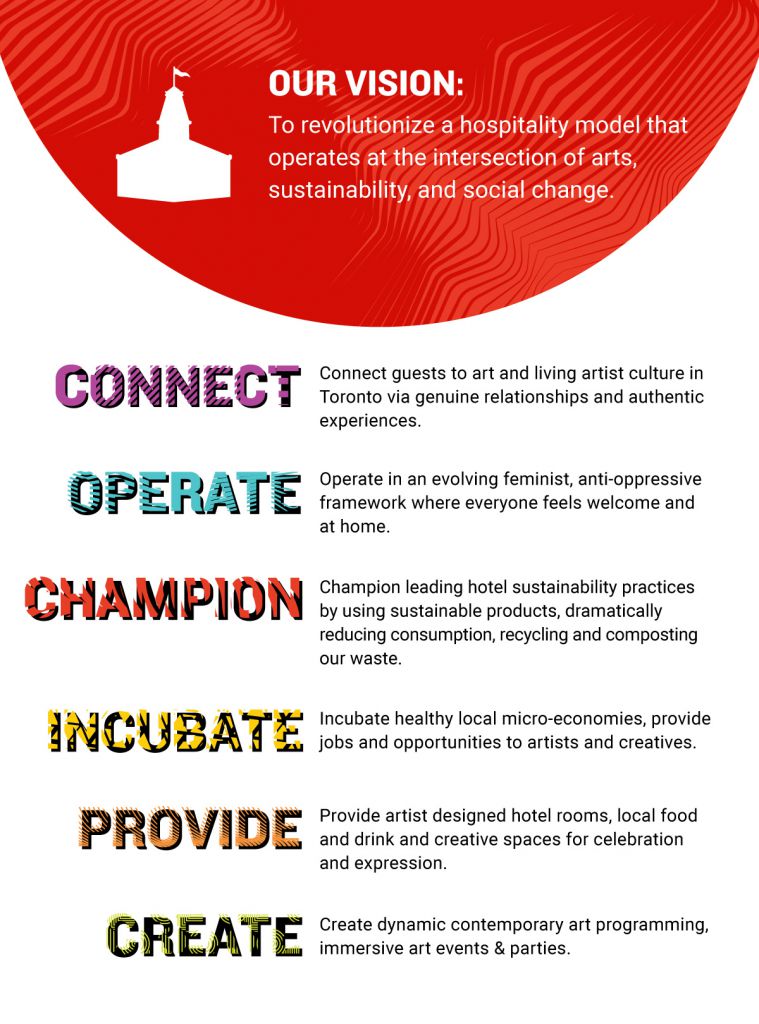 They put action to words by writing an employee operating manual based on Zeidler’s original documentation. Zeidler wants her employees to know their rights. The Employee Standards Act (ESA) covers some, such as the 40-hour workweek and parental leave. The challenge for the Gladstone was beefing up the writing to reflect their feminist and anti-oppressive principles. That means, says Zeidler, “trying to pay attention to best practice” and that’s “a moving target” which means, “you’re always changing.” She describes the employee manual as “living documents” that change “if best practices change.”
They put action to words by writing an employee operating manual based on Zeidler’s original documentation. Zeidler wants her employees to know their rights. The Employee Standards Act (ESA) covers some, such as the 40-hour workweek and parental leave. The challenge for the Gladstone was beefing up the writing to reflect their feminist and anti-oppressive principles. That means, says Zeidler, “trying to pay attention to best practice” and that’s “a moving target” which means, “you’re always changing.” She describes the employee manual as “living documents” that change “if best practices change.”
While the staff is primarily women and/or queer identified, the Gladstone does not expect anyone to self-identify with labels or check boxes. They are committed to the principles of equal employment opportunity and work to remove barriers for all qualified persons, hiring, for instance, without regard to race, national or ethnic origin, color, citizenship, religion, age, sex, marital status, mental or physical handicap, even criminal conviction if it is unrelated to employment. Staff express themselves creatively through fashion sense and hairstyle. No one wears a uniform other than barbacks and porters (so guests can identify them). Zeidler herself looks less Hotel President than Chief Alchemist, sporting a punk art aesthetic, hair long on one side, cropped short underneath on the other.
Creating a safe and creative workspace is good for employee retention. David McNeil, 51, a server-barista-bartender, has worked at the Gladstone since 2006. He trusts the management to make sure the staff has the knowledge they need to live up to best practices. “We have had sensitivity training and workshops to get us more up to speed with new codes.” Also a visual artist, he shows his work at the staff show every year and says he loves coming to work. “An arty crazy entity attracts arty crazy people.” He thrives on the diversity. “I’d never before in my life worked with trans people and I’ve worked with five or six and it’s fantastic, they’re just doing jobs, and it’s not an issue here.”
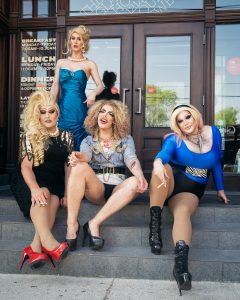
Chris Mitchell, 54, who worked at the Gladstone in the early days, tried to leave but missed working with Zeidler so much she returned, and is now manager of Creative Partnerships and Special Projects. Mitchell helps manage the exhibition programming that occurs 365 days of the year, with 100 events per month, and 70 percent of which are cultural events, versus private or corporate. Some 13% of the hotel’s gross revenue goes into the pockets of artists directly. The Gladstone prides itself on being about the “local dollar.” From music bingo to their famous karaoke nights, Mitchell champions the motely crew of neighbhourhood regulars who entertain international travelers passing through the hotel. A lot of local artists see the place as home because they got a chance to show their work there over a decade ago. For an ecosystem to work in a sustainable way, within a feminist framework, things cannot exist in silos. “I love the mix of business and art especially,” she says. “I also appreciate that I get to connect with so many amazing organizations and individuals through our collaborations, partnerships and projects.”
The vibe as staff buzzes about doing their tasks is friendly, artsy, unpretentious. Says Zeidler: “If you want status-quo, the Gladstone isn’t the place to find it. If you want this weird collection of magic ponies, come here and you are going to have a really good time.” Her eyes brighten as she smiles at me, like I should know what a magic pony is. Mitchell lends a hand, explaining that the magic ponies are about celebrating individuality among the staff. “It’s the differences that make people magical. We celebrate the quirks.”
Room Service with a Side of Social Impact
The Gladstone’s mission statement shapes the guest experience as well—namely, guests checking in don’t have to leave their values at home. Take its Green Policy initiative, Check-in, Don’t Checkout, meant to inspire a new normal for environmental hotel practices. Zeidler believes it’s important to have activists challenging the norm, fighting to make large institutional change. When the hotel banned plastic bottles in 2007, people were shocked. But serving tap water saved 270,000 water bottles and now the practice is not only accepted, it’s expected. “People shouldn’t have to leave their values at home when they’re on vacation,” says Zeidler. Other sustainability initiatives include two green roofs, hotel-wide composting and recycling, and 100% locally sourced dry bar and in-room amenities.
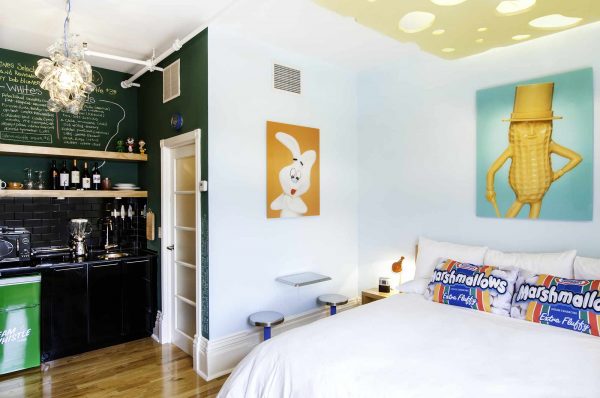
Guests are also treated to a feast of local art. Every one of the 37 hotel rooms is an immersive artistic experience, designed by a different local artist. Such design extravagance is expensive and logistically challenging—and goes against any best practices of running a hotel. But it’s also what put the Gladstone on the map as a one-of-a-kind international destination. “I won’t stay anywhere else,” says Greig Lawson, 41, in a lilting Scottish accent. He has been coming the Gladstone for six years with a group of colleagues from Queen Margaret University in Edinburgh. “The staff are amazing, the rooms are just so quirky. No two nights are alike. Back home in Scotland everyone wants to know what the Gladstone is like.”
Local real estate agent Danyelle Boily has been a customer since renovations in the early 2000s and now lives in a condo across the street. “Those changes happened slowly, it was respectful and inclusive to the people who were there at the time,” says Boily, who uses the Gladstone for business meetings and as a personal hangout. “Book launches for my friends, the drag shows are a riot, the art exhibits. I’ve even been to a memorial service here.” Perhaps most notably, she says it is safe space where a single woman can go at night and not be hassled.
Bathroom Conventions Get Flush of Fresh Air
Indeed, the Gladstone has worked hard to establish itself as a safe space through arts and queer community programming, partnerships and a business approach guided by its Anti-Oppressive Framework Policy. But it hasn’t been without hitches. An employee with an outside security company the Gladstone had contracted once followed a non-binary guest into the men’s washroom, making the guest feel unsafe. “It was a horrible thing to happen to someone and completely against our policy,” Zeidler says. The guest spoke out, and Zeidler listened. The guest engaged both the hotel and the security company to collaborate in developing a non-gendered washroom policy. The Gladstone then trained staff and developed anti-oppressive compliance requirements for partners and outside contractors.
More recently, a non-binary guest planning an event at the Gladstone questioned the hotel on how they could ensure safety in washrooms that remained gendered. Rather than maintain the status quo, Zeidler looked outside “to see where the best practice is happening,” which,she says, is often in universities or artist collectives. Gladstone partnered with George Brown College’s “Free to Pee” initiative to create and communicate inclusive safe spaces in all washrooms. The school provided signs for the bathroom that read: “Neither is me…but I still gotta pee.” and “I know who I am…assume I belong.”
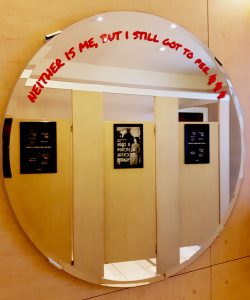
The Gladstone turned what seemed a setback into a step forward. “That’s the part about feminism and anti-oppressive practice,” says Zeidler. “Figure out that sometimes you’re going to get it wrong, and then listen. Then try to adjust.”
No vacancy for partners without value-alignment
The Gladstone has not been content to sit on their values in house, either. Their constant re-evaluation of inclusiveness in business practices extends to hiring external suppliers. When the hotel looked to hire an outside contractor for tech and IT services, Zeidler discovered that three on her list had zero women on their tech teams. She challenged them to improve their staff gender ratio then hired the company who took her comments seriously. Shael Risman of PACE Technical says it was a “healthy eye opener” to hear from Zeidler. Risman says PACE didn’t intentionally set out to hire only men, yet were receiving getting primarily male applicants. Zeidler recommended the company use fitzii, hiring advisors that helped improve Gladstone’s hiring process. For PACE, fitzii changed the language of job postings and targeted different job sites. That not only attracted plenty of women but a higher caliber of applicants who were a better fit for their work culture. PACE has since committed to a five-year plan to achieve an equal number of male and female tech employees.
The Road to B-Corp Took Some Convincing
The challenge to keep improving came back at Zeidler when business colleagues began encouraging her to become B-Corp certified, including her sister, Margie Zeidler. Margie also charted a career in the family business, but took her own unusual path as a social-purpose real estate developer, restoring heritage-designated buildings with environmentally and socially sustainable practices.
Initially, Zeidler resisted, worried the B-Corp designation was too American, too corporate. But as her team began exploring the movement, they began to see how it would actually help the Gladstone articulate its nonconformist business model. In 2018, the Gladstone became Canada’s first B-corp hotel. Mitchell, who headed the project, says that going through the process strengthened their feminist mission. “We started to be much more outwardly facing as being a feminist run business.”
For the record, LiisBeth is also a B-Corp certified company, as is fitzii.
For Zeidler, joining the B-Corp movement has helped her see there are corporations like her own that are doing business differently. She says the next question is, “How can we build a community around those different kinds of corporate entities? And how can we shift capitalism? It doesn’t need to suck ass.” She laughs, but in way that suggests she is dead serious.
***
Christina Zeidler and Chris Mitchell are presenting a workshop: Put Your Feminist Values into Policy and Practice in Your Business, at the second annual Entrepreneurial Feminist Forum on Monday, December 2, from 10:45 a.m. to 12:15 p.m.


Related Articles
https://www.liisbeth.com/2017/08/17/uber-feminist-enterprise/
https://www.liisbeth.com/2016/10/12/feminist-entrepreneurship-changing-the-face-of-capitalism-one-enterprise-at-a-time/
You are visiting Liisbeth’s archives!
Peruse this site for a history of profiles and insightful analysis on feminist entrepreneurship.
And, be sure to sign up for rabble.ca’s newsletter where Liisbeth shares the latest news in feminist spaces.





